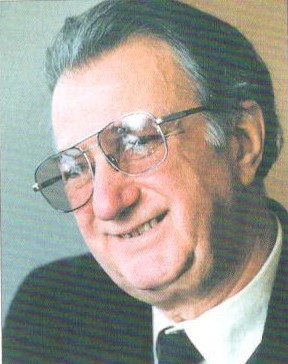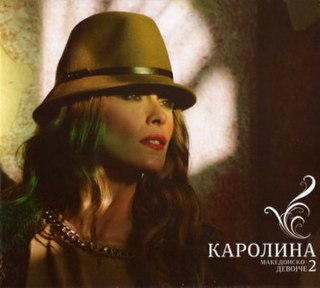Related Research Articles

Karolina Gočeva, sometimes credited as Karolina Gocheva or known only as Karolina, is a Macedonian singer. She launched her music career in 1991 with a performance at a local children's show and continued participating in the following years, receiving recognition for her talent. In 1992, she released her first children album titled Mamo, pušti me. She signed a contract with the record label Avalon Production in 2000.

Mateja Matevski was a Macedonian poet, literary and theater critic, essayist, and translator.

Goran Stefanovski was a leading Macedonian dramatist, screenwriter, essayist, lecturer and public intellectual. He wrote for the theatre, television and film, as well as pursuing a long academic career in teaching creative writing for the theatre and film.

Aleksandar Džambazov was a Macedonian conductor and composer. He finished Musical academy in Belgrade, and spent majority of his career at Macedonian Radio Television, as a conductor of the Dance and Special orchestra. Has made numerous recordings and live concerts, and has performed in North Macedonia and in many countries abroad. He has won many awards.

Slavko Janevski was a Macedonian poet, prose and script writer. He was also active as a comics artist. He finished high school in Skopje. From 1945 onwards he was the editor of the first teenage magazine called "Pioneer". Janevski is the author of the first novel to be written in Macedonian, Seloto zad sedumte jaseni. As script writer he adapted the historical drama "Macedonian bloody wedding" in 1967. Janevski received many awards, among others "AVNOJ" 1968 and "Makedonsko slovo" for the book Thought. He is considered to have laid the foundations of the Macedonian literature.

Makedonija Zasekogaš often credited as Makedonija Zasekogash, is a project made by the Agency for youth and sport of Macedonia realized with an album. The album consists of 14 traditional Macedonian songs with new arrangement sung by the Macedonian music stars.
Makedonsko devojče is a Macedonian song written and composed by Jonče Hristovski in the style of newly composed folk in 1964. The title directly translates as 'Macedonian girl' or 'Macedonian maiden'.
Armenians in North Macedonia are the ethnic Armenians in North Macedonia. The number of Armenians is about 300 people.

Petre Prličko was a Macedonian actor. According to the periodical Razgledi, he was a "legend of Macedonian theater".

Makedonsko Devojče 2 is the eighth studio album by Macedonian singer Karolina Gočeva released on 25 February 2014. Avalon Production launched the album in Macedonia, while Croatian label Dallas Records released it throughout former Yugoslav countries in April 2015. The album consists of eight original songs written by Valentin Soklevski and Vesna Malinova; the arrangement and production were completed by Nikola Micevski and Dejan Momirovski. Except for those eight songs, two cover versions are also included, one of them being of a Macedonian traditional song and the other one of a record originally performed by Macedonian singer Pepi Baftirovski. For Gočeva, the motivation to record the album came from the critical and commercial success of her previous project inspired by the Macedonian traditional music, Makedonsko Devojče (2008).

Dragi Zmijanac is a Macedonian social worker, humanitarian and children's rights activist.
Zoran Todorovski was a historian from North Macedonia. Todorovski has criticized the Macedonian historiography as selective and one-sided.

Jakov Lazaroski was a Yugoslav-Macedonian political commissar and academic.

Sofija Grandakovska is an academic, poet and author in the field of comparative literature studies and interdisciplinary studies in Holocaust, Jewish history, literature and culture, with a specialization in the Jewish and Holocaust history in the Balkans. Another area of interest is Byzantine studies. She has significant publications in literary and visual semiotics, literary theory, critics and interpretation and art.
Ivan Dorovský was a Czech Balkanologist of Macedonian origin. He worked as a literary scholar, translator, poet and publicist, university professor at Masaryk University, and Slavist. He was also the Chairman of the Society of Friends of the South Slavs. He was the 2008 recipient of the Macedonian honorary Racin Recognition for his contribution and affirmation of Macedonian literature and culture, and the 2013 recipient of the F. A. Zach Prize for his contribution to the relationship with the Serbian nation.

The House of Velimir Gjinovski is a historical house in Galičnik that is listed as Cultural heritage of North Macedonia. It is in ownership of one branch of the family of Gjinovski.

The House of Slavko Brezovski is a historical house in Galičnik that is listed as Cultural heritage of North Macedonia. It is in ownership of one branch of the family of Brezoski.

Nace Dimov, also known as Atanas Dimov Čupovski оr Čuparov, was a Macedonian political and cultural activist. He was the older brother of Dimitrija Čupovski. Dimov was a writer on the Macedonian Voice newspaper. Among his publications include "Macedonia in the Past, Present and Future" and "Historical Outline of Macedonia and the Macedonian Slavs".
Vlado Makelarski was a Macedonian Partisan in World War II.

Božidar "Božo" Vidoeski was a Macedonian linguist and the founder of Macedonian dialectology.
References
- 1 2 Obituary: Jonče Hristovski Archived 30 May 2011 at the Wayback Machine
- ↑ Encyclopaedia Macedonica, p 1591, Macedonian Academy of Sciences and Arts, Skopje, 2009 ISBN 978-608-203-023-4 and ISBN 978-608-203-024-1
- 1 2 "Јонче Христовски". Македонска нација. Retrieved 8 May 2020.
- ↑ "Makedonsko Devojče – Utrinski vesnik". Archived from the original on 26 February 2012. Retrieved 8 May 2020.
- ↑ Encyclopaedia Macedonica, p 1592, Macedonian Academy of Sciences and Arts, Skopje, 2009 ISBN 978-608-203-023-4 and ISBN 978-608-203-024-1